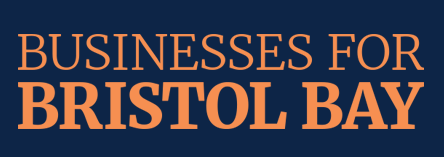American Access to Wild Salmon on the Line as Risky Mining Project in Bristol Bay Advances through Federal Permitting
Businesses including Whole Foods, PCC Community Markets, Seattle Restaurant Alliance, Coastal Transportation, Patagonia, Orvis, Leader Creek Fisheries and more than 200 others urge U.S. Army Corps of Engineers to reject proposed Pebble Mine
Seattle, WA: Business leaders from Seattle and beyond released a letter today calling on the U.S. Army Corps of Engineers to suspend its federal permitting process for the controversial Pebble Mine project and to protect Bristol Bay’s salmon fishery - the largest and most valuable in the world. The letter states:
“Given the ecological sensitivity of the Bristol Bay watershed, it deserves the most rigorous, science-based environmental impact assessment possible. Anything less jeopardizes the economic stability of our industries and bottom lines… The [National Environmental Policy Act] process was created to ensure transparency and protection of the American public, especially in places like Bristol Bay that provide irreplaceable public goods and benefits. The undersigned businesses ask that the Army Corps restart its review of the Pebble Partnership’s permit application and hold this project to the highest bar.”
Far Bank Enterprises, whose subsidiaries operate under the brand names Sage, Redington, RIO Products, and Fly Water Travel, have long been advocates for protecting Bristol Bay. “Our brands and the fly fishing industry at large have been involved in the efforts to protect Bristol Bay from the Pebble Mine for well over a decade. It’s one of the major conservation battles for recreational fishing, and the Bristol Bay fishery supports not only lodges and outfitters in Alaska but also manufacturers, retailers, and travel agencies across the nation. Until we see Bristol Bay protected, we will not relent. The process must be science-based, rigorous, and transparent. That doesn’t appear to be the case and we join Businesses for Bristol Bay in calling on the Army Corps to suspend its review of Pebble’s application until full and accurate details of the project are available,”said Tag Kleiner VP of Marketing for Far Bank Enterprises.
Unlike issues that tend to wedge salmon harvesters apart, protecting Bristol Bay has unified a unique coalition of Tribal, commercial fish and sport fish advocates. For perhaps the first time in history these cross sections of salmon and society have come together to stop this irresponsible project from gaining any more momentum and to protect Bristol Bay once and for all.
“While there is so much at stake in this relative to business and industry, as an indigenous person from Bristol Bay I want to be sure that residents of the Pacific Northwest and our leaders understand that safeguarding our salmon is about more than just short-term jobs or environmental preservation; it is about equity for our people who have been sustained physically and spiritually by this incredible resource of wild salmon since time immemorial,” said Bristol Bay leader Everette Anderson.
“Wild salmon is what brings people to Seattle. Wild salmon is what brings people through our restaurant doors. If the Pebble Mine gets approved in Bristol Bay, then we’ll lose our single largest source of wild salmon. That’s why I’ve been fighting to save Bristol Bay’s salmon fishery for years, and I’m not about to stop. This fishery is too important for our country and we need our federal government to do its job and protect it,” said Seattle Chef Tom Douglas.
"PCC is proud to stand alongside hundreds of other businesses around the country in calling for the protection of Bristol Bay’s salmon fishery from the proposed Pebble Mine. We have been involved in the fight to save Bristol Bay for nearly a decade and we will continue to stand with Bristol Bay’s fishermen, Native communities, and businesses for as long as it takes to get Bristol Bay the protection it deserves,” said Brenna Davis, VP of Social and Environmental Responsibility for PCC Community Markets.
“Bristol Bay will continue to be a thriving fishery and source of renewable fishing jobs if the salmon have access to healthy habitat and clean, free-flowing water. If you look at the history of salmon habitat destruction, it is usually not one cause, but typically a death by 1,000 cuts. With the Pebble Mine, the first cut for Bristol Bay salmon would be with a machete”said Bristol Bay fisherman Nick Lee.
“In addition to the thousands of jobs and businesses supported by the Bristol Bay sockeye salmon fisheries, protecting this crucial salmon habitat means preserving one of the last remaining and certainly the most significant stronghold of sustainably caught wild salmon left on the planet. As a Seattle chef and restaurateur, I don’t want to imagine a world in which wild salmon is not available for me to cook and serve to my guests. If we do not stop the Pebble Mine now, then that could one day become our reality. We need our members of Congress to step up once again and reiterate to the Trump Administration that we cannot afford to risk harming the delicate ecology of the Bristol Bay region with hard rock mining and we must ensure that it gets the utmost protection. The future of wild salmon and the worldwide seafood supply depends on it,” said Kevin Davis, Executive Chef and Owner of Blueacre Seafood and Steelhead Diner.
